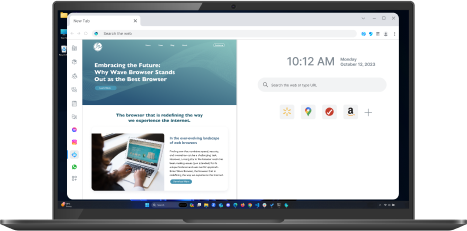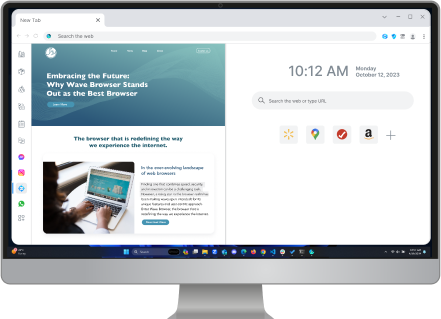Is Incognito Mode Truly Safe? The Truth About Private Browsing
Table of Contents

Securing our personal information has become a top priority in today’s digital world. As concerns about privacy continue to rise, many people rely on incognito mode for a more secure browsing experience.
Among the various privacy features, incognito mode and private browsing have become popular choices for those seeking more secure browsing. These modes promise to shield users from tracking by preventing the storage of browser history, cookies, and site data. By offering this level of discretion, they provide a measure of protection against advertisers and third parties monitoring your online activities.
But does it actually protect your data? In this post, we’ll explore what incognito mode really does, how it helps secure your personal information, and where it might fall short.
What is Incognito Mode?
Incognito mode, also known as private browsing, is a feature available in most web browsers that allows users to browse the internet without leaving traces of their activity on the device. When you use incognito mode, your browser doesn’t store browsing history, cookies, site data, or form inputs after the session ends. This means that websites you visit won’t appear in your history, and any login information or preferences are not saved once you close the window.
Chrome incognito mode, for example, lets you share devices, and it's perfect for hiding surprise gift searches, using a proxy unblocker, or keeping searches unattached to your Google account.
However, it’s important to note that incognito mode doesn't make you completely anonymous. Your internet service provider (ISP), the websites you visit, and any network administrators can still track your activity. It simply prevents the browser from retaining data about your session locally.
Is Incognito Mode Safe?

So just how safe is incognito mode, really? While it is nowhere near being a complete source of internet security, private window web browsing does provide some security features and protection from third parties that try to collect your personal data:
- Blocks Browsing History Storage: It doesn't save your browsing history on the local device.
- Prevents Storage of Cookie, Cache, and Site Data: Cookies and site data accumulated during the session are deleted once the session is closed.
- Erases Local Data: Any data generated during the session, like forms you fill out and any email address you share, won't be saved locally.
- Disables Search Autofill: Your search queries and form entries won't be remembered for autofill in future sessions.
- Session Isolation: Each Incognito Mode session is separate from your regular browsing, reducing cross-session tracking.
- Shared Device Use: Useful for maintaining privacy on shared computers where you don't want your history stored.
- Logged-Out Experience: Websites like YouTube or Facebook might not recognize you if you're logged out of accounts, providing some anonymity.
And might help you unblock websites and bypass restricted content.
Is Incognito Mode really private?
When you open a new incognito window or new private window, you put a mask on your search history but it's not a guaranteed disguise. Incognito mode in web browsers offers some degree of privacy by not saving your browsing history, cookies, or site data on your local device, but it doesn't provide complete privacy.
Third-party cookies and trackers can access your personal information and monitor your online activity beyond private browsing mode. Additionally, search engines like Google and social media giants like Facebook can still glean insights from your searches if you log in while browsing on an incognito window.
Why Incognito Mode might not be as safe as you think

- IP (Internet Provider) Tracking: Your ISP can still see your online activity, including the websites you visit.
- Website and Browser Tracking: Websites can still collect data about your visit, such as your IP address and other browser characteristics using advanced methods like browser fingerprinting to identify you.
- Search engines Like Google Chrome, Mozilla, Safari, Firefox, and Microsoft Edge: Even in Incognito mode, your search queries can be tracked by search engines. While your local search history might not be saved, the search engines themselves can still log your queries and connect them to your IP address.
- Browsing with logged-in accounts: If you login to accounts (e.g., Google, Facebook) while using Incognito Mode, those services can still collect data about your activity.
- Device and Network: Your device and network might still be able to log your activity, even if your browser isn't storing it locally.
- Extensions and Plugins: Browser extensions can continue to track your browsing activity.
Overall, Incognito Mode provides a certain level of privacy for your local device, but it doesn't protect against external tracking or guarantee complete anonymity.
If you're looking for additional privacy-enhancing tools, assistive technology, and instructions for better internet safety, check out these privacy-conscious browser extensions or download a secure web browser that actively works to minimize the information exposed by your browser. You might also consider using a Virtual Private Network (VPN) after opening a new private window.
Enhance privacy and security with VPN
While incognito mode provides limited online safety, combining this tool with a VPN and the most secure internet browser can provide a more comprehensive approach to online security. A VPN encrypts your data and funnels it through servers around the world, masking your IP address and protecting you from local prying eyes, your ISP, and even potential hackers lurking on public Wi-Fi networks. VPNs offer a comprehensive solution against a broad spectrum of threats, including malware and identity theft. They're also useful in cases where you want to unblock browser sites.
VPN and Incognito Mode for multi-faceted protection
When used alongside a secure web browser, a Virtual Private Network (VPN) adds an extra layer of protection that goes beyond the limitations of Incognito Mode, offering enhanced privacy and security for your online activity. Here's how a VPN works to provide enhanced privacy and protection that Incognito Mode can't:
- Encryption of Traffic: A VPN is safe because it encrypts your internet traffic, making it difficult for third parties, including your ISP and hackers, to intercept and decipher your data.
- IP Address Concealment: A VPN masks your IP address by routing your traffic through a server in a different location. This makes it challenging for websites and online services to trace your activity back to your actual IP address. You can also use location permission settings to disable location access on specific sites.
- Bypassing Geo-Restrictions: A VPN allows you to access websites and content that might be restricted or blocked in your region. By connecting to a server in a different country, you can appear as if you're browsing from that location.
- Protection on Public Wi-Fi: When using public Wi-Fi networks, a VPN can prevent potential attackers on the same network from intercepting your data.
- Comprehensive Anonymity: While Incognito Mode minimizes traces of your browsing history on your local device, a VPN goes a step further by masking your online identity through encryption and IP address manipulation.
- Protection Beyond the Browser: A VPN encrypts all internet traffic from your device, not just browser activity, providing more overall secure browsing. This includes all applications and services that access the internet, offering a more comprehensive level of protection.
- Reduced Tracking: Along with an ad blocker browser, a VPN can reduce the ability of websites and advertisers to track your online behavior across different sites since your IP address is constantly changing.
Some important information to note is that while a VPN can provide stronger privacy and security, no solution is completely foolproof. Some websites and services might still be able to identify VPN usage, and the effectiveness of a VPN can depend on the quality and policies of the VPN service you choose.
Combine Incognito with other safe browsing tools
Hopefully, by now you are no longer wondering Is incognito mode safe? As you know, private browsing, whether it be on Microsoft Windows 10 or your mobile device, cloaks your browsing history within your browser, but it doesn't obscure you entirely.
VPN encryption and IP-shuffling provide a broader shield that secures your entire internet journey. However, neither solution is an impenetrable barrier.
The take-home message is clear: regardless of which supported operating systems you use, online safety hinges on a multi-faceted approach combining different security tools and practices. So, use incognito mode in combination with the encryption of a VPN.
You want to choose a browser reputable for being a safe browser? There are plenty of reasons to switch to Wave Browser, the main one being that it is one of the most secure browser on the web.
Get your free, secure browser download today!
Surf with Ease, Speed, and Security!

Download Wave Browser for a seamless online experience like never before. Try it now!


























